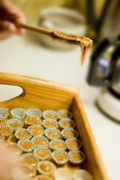
It’s no secret that Americans eat a lot of high fructose corn syrup (HFCS). Since the 1970's the sweetener has been used in practically every known food product in the Western diet because it is cheaper to produce than table sugar, easy to transport and keeps food moist. But until now there has been little scientific evidence to suggest if it was a “safe” alternative sweetener or some sort of “Franken food” that could adversely impact your health.
But, just how much of this refined sugar do we consume? I mean, really, is it enough to be concerned? Yes. Between 1970 and 1990, the consumption of HFCS in the U.S. has increased more than 1,000 percent, according to an article in the April 2004 issue of the American Journal of Clinical Nutrition.
In 2008, the average American consumed 38 pounds of HFCS according to data published by the United States Department of Agriculture (USDA) Economic Research Service. HFCS, primarily made from genetically modified corn, accounts for more than 40 percent of the caloric sweeteners added to our foods and beverages.
Earlier this year, researchers from Princeton University showed that HFCS is largely to blame for the obesity crisis in Western cultures, and a Duke University Medical Center study found that HFCS consumption was associated with liver scarring or fibrosis among patients with non-alcoholic fatty liver disease.
Now, a new study from UCLA Jonsson Comprehensive Cancer Center has found that HFCS drives cell division in cancerous tumors and accelerates the cancer growth. While it's widely known that cancers use glucose, a simple sugar, to fuel their growth, this is the first time a link has been shown between fructose and cancer proliferation.
“The bottom line is the modern diet contains a lot of refined sugar including fructose and it’s a hidden danger implicated in many modern diseases, such as obesity, diabetes and fatty liver," said Dr. Anthony Heaney, an associate professor of medicine and neurosurgery, and the study's lead researcher.
For this study, Heaney and his team took pancreatic tumors from patients and cultures and grew the malignant cells in Petri dishes. Then they added glucose to one set of cells and fructose to another. By using mass spectrometry, the researchers were able to follow how the cells metabolized the sugars to determine what exactly they were being used for and how.
Conventional wisdom previously held that glucose and fructose have been considered interchangeable simple sugars that were similarly metabolized, but Heaney’s research found that the pancreatic cancer cells could easily distinguish between glucose and fructose, and the cancer cells metabolized the sugars in very different ways.
In the case of fructose, the pancreatic cancer cells used the sugar in the transketolase-driven non-oxidative pentose phosphate pathway to generate nucleic acids, the building blocks of RNA and DNA, which the cancer cells need to divide and proliferate.
“These findings show that cancer cells can readily metabolize fructose to increase proliferation. They have major significance for cancer patients, given dietary refined fructose consumption,” stated the study, published in the Aug. 1 issue of the peer-reviewed journal Cancer Research. Heaney said that while this study was done in pancreatic cancer, these finding may not be unique to that cancer type.
“I think this paper has a lot of public health implications,” Heaney said. “Fructose intake has increased dramatically in recent decades and as in anti-smoking campaigns, a federal effort should be launched to reduce refined fructose intake. Hopefully, at the federal level there will be some effort to step back on the amount of HFCS in our diets.”
According to the Encyclopedia of Junk Food and Fast Food, HFCS is used extensively in the United States because it is somewhat cheaper than in other parts of the world as a result of a combination of corn subsidies and sugar tariffs or quotas. Since the mid-1990s, the United States federal government has subsidized corn growers by $40 billion.
Lynette Summerill is an award-winning writer who lives in Scottsdale, Arizona. In addition to writing about cancer-related issues, she writes a blog, Nonsmoking Nation, which follows global tobacco news and events.




Add a Comment6 Comments
Anonymous, you might find this article answers your questions. It contains a Washington Post interview with Dr. Bart Hoebel, the lead author in the obesity study. http://www.grist.org/article/hfcs-study-authors-defend-work-against-attacks/
Dr. Hobel's work has come under fire from proponents of the Corn Refiners Association, the organization behind SweetSurprise.com
After reading both sides, I'd love to hear what you think.
August 16, 2010 - 11:15amThis Comment
fhe article you have directed me to is a basic research article giving the details of an experiment conducted on rats for obesity.it would be unfair to implicate HFCS on the basis of this article.all carbs cause obesity, this article would be of use if used to select HFCS as a sugar substitute.
August 28, 2010 - 5:43amThis Comment
this article is an eye opener to one of the sugars we keep on having in our food.it would do a lot of good if you could specify the types of food which carry a high corn syrup load.the other question is , that ,is it really the corn sugar or is it the obesity leading to fatty change ,which is causing all the trouble.and will the research into cancer cells using fructose help develop an antimetabolite to block this metabolic pathway.
August 15, 2010 - 12:01pmThis Comment
When I read a beverage or food label, I do not want to see high-fructose corn syrup, and for me finding that a product contains high-fructose corn syrup is a definite "will not buy" indicator, and additionally I find it quite annoying, often to the point that even if a company has many products but only one of them contains high-fructose corn syrup, I will not buy any of their products. I look forward to the day when high-fructose corn syrup is sent directly to the gluttony ring of Dante's "Inferno", which is where it belongs, for sure .
August 14, 2010 - 7:31pmThis Comment
Wow. Your post not only plays fast and loose with the facts, but draws off-base conclusions from the various studies, which, by the way, do not draw the conclusions you purport that they do. Here are the facts: Americans get more fructose from refined sugar (which contains fructose and glucose) than high fructose corn syrup, according to USDA data. Focusing on fructose is unhelpful to Americans trying to lead healthier lives. --Consumer Freedom
(Moderator's Note: Consumer Freedom is a non-profit organization which states that it is supported by restaurants, food companies and individual consumers. )
August 13, 2010 - 3:02pmThis Comment
I'm hypoglycemic, so I read ALL labels and avoid as much sugar as I can. I've discoverd HGCS in almost everything, even loaves of bread, cans of soup, especially boxed cereals. I WON'T eat any of these items becasue I don't want to overwork my pancreas (isles of Langerhorn) and become a diabetic. I teach people about reading labels all the time, ex. Yoplait contains so much junk, they CAN'T call it yogurt anymore so they changed the name. It's unfortunate that it's such a BIG seller because it's JUNK. Read the label. Jiff, Peter Pan, all those junk peanut butters containing sugar & partially hydrogenized fat are also responsible for obesity. I teach parents to feed their children REAL peanut butter. I could go on & on about the food industry & what it's doing to fool people these days. But, people need to take responsibility and READ the labels on their food packages. Another really bad food additives are the sodium nitrates & nitrites. The amount of sodium people ingest in this country is abominable. Heart disease waiting to happen. People need to get back to eating fresh & wholesome foods, NOT JUNK.
August 12, 2010 - 9:00amThis Comment